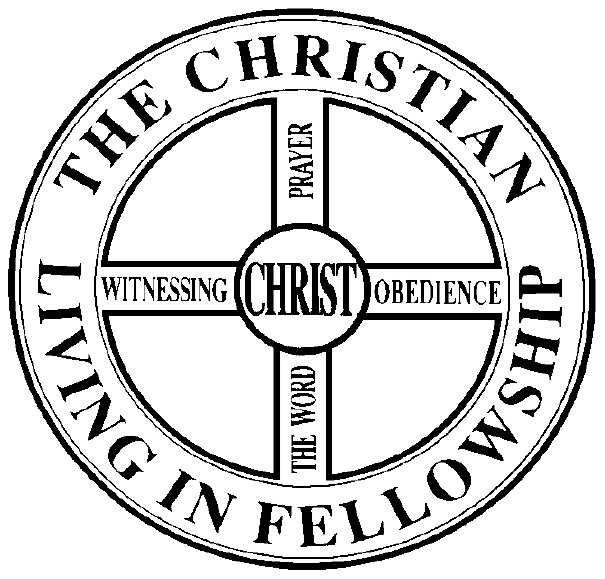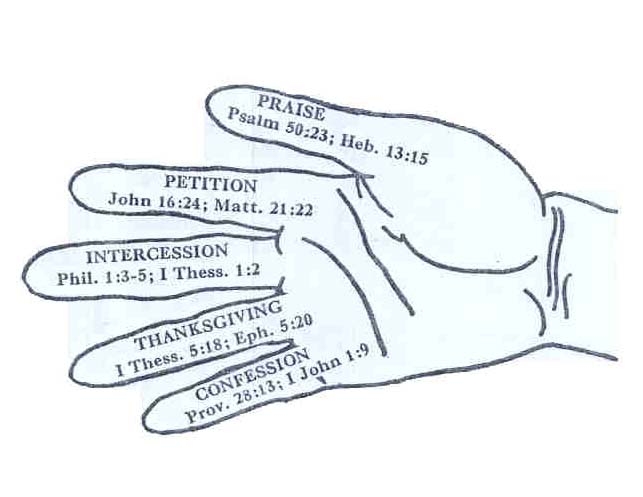
Speaking with Christ
A believer can do nothing unless he or she is deeply rooted in Christ. One part of deepening those roots is listening to Him speak directly to the needs of our heart and life, which He does primarily through His Word. Have you been meeting with God daily, allowing Him to speak to you through His Word and putting into practice what He teaches you? That should be the goal toward which every one of us strives, yet that is only one direction in the communion Christ seeks with His people. He speaks to us through His Word, but He waits for us to respond through prayer.

Recalling the Wheel Illustration, the Word and Prayer make up the two vertical spokes of the Wheel, and represent our direct relationship with Christ. As He teaches us through His Word, much of what He asks us to put into practice deals with our relationship with other people. So Obedience sits nicely on a horizontal spoke, which together with Witnessing, succinctly describes our key means of interacting with others. As Training Evangelistic Leadership founder, Roy Robertson would remind us, all spokes need to be in balance. So it is in our relationship with Christ: When talking about a devotional or quiet time, our time in the Word should be balanced with time in prayer.

Illustrations help disciples quickly grasp and retain spiritual concepts. They are then able to turn around and share them with still others. We liken prayer to the five fingers of a hand, which represent five phases of a complete prayer or five different kinds of prayer. In the setting of a Quiet Time, we would normally move through all five phases of prayer. But in a typical day, we might pause at any time for only one or two of these kinds of prayer. These five phases are:
- Confession (e.g. Isaiah 59:1-2; 1 John 1:9) — We always encourage our disciples to begin with confession, particularly at the beginning of a Quiet Time. That allows us to "get on praying ground" for God to be free to hear us and speak with us. Confession means we are agreeing with God, admitting our sins rather than trying to cover them.
- Thanksgiving (e.g. 1 Thessalonians 5:18; Ephesians 5:20) — It is natural to follow confession with thanksgiving, expressing gratitude for the forgiveness Jesus bought for us on the Cross. But we have many more things than that for which to thank Him. Indeed, Paul reminds us to thank the Lord at all times and in all circumstances—even in trials and difficulties—for that is God's will for us.
- Intercession (e.g. Job 42:10; James 5:16) — The part of prayer most natural to us is supplication--making our requests known to God. For teaching and self-discipline purposes, we divide supplication into two parts: Intercession and Petition. Intercession is praying for the needs of others, and you'll note that it comes first in our order and falls on the longest finger so as to remind us to pray first and longer for the needs of others rather than ourselves. Scripture gives us many "others" for which to pray: authorities, lost souls, the sick, "harvest" laborers, unsaved relatives, outsiders, missionaries and church members, to name a few.
- Petition (e.g. Matthew 21:22; 1 John 5:14-15) — But we too have needs and are encouraged to bring those before the Lord as well. Praying for our own needs, we call Petition. Whenever we pray for our own or others' needs, there are three things we need to remember:
- Praise (e.g. Psalm 107:8, 15, 21, 31; Psalm 71:8) — We thank the Lord for things He gives to us or does for us. But we praise God for Who He is. We praise and worship Him because He is the true God who is full of mercy, love, truth and holiness; and He is the Source of all life and light and love. Praise is tightly linked to the other forms of prayer, just as the thumb works in concert with the other fingers to help us hold on to things.
Bible reading would normally fall between Confession and Thanksgiving, or else fall in the midst of our time of Thanksgiving, since that is a natural response not only to forgiveness, but also to what the Lord has shown us through His Word.
Adding Prayer to your time in the Word completes a proper Devotional Time. Without a living communion with the Lord, no servant of God will make it far. There are aspects of our relationship that come more naturally to us than others, but every aspect needs to be developed in order for us to grow to full maturity. Those who skimp on the Word in preference for Prayer will have great love for the Lord, but won't know Him very well. Those who are light on Prayer and strong in the Word will tend toward a cold, "academic" relationship with Christ—they'll know about the Lord without really knowing Him. The Lord takes no great delight in either extreme. Rather He wants us to know Him even as we are fully known.
But what happens when you have lots of people and things to pray for? Have you ever gotten so overwhelmed by all those needs that your prayer life just fizzled out? I'll share some tools in another post to help you stay faithful at praying for all the needs and concerns that come your way in your pursuit of Christlikeness.
Resources
- Personal Reading Record - A tool to help you keep track of where you've read and where to read next
- Bible Reading Highlights Record - A tool to help you record your thoughts and applications when you read the Word
- The Timothy Training Workbook - A printable (front & back) discipleship notebook written by veteran Navigator missionary and founder of Training Evangelistic Leadership, Roy Robertson
Courtesy of Roy Robertson and Training Evangelistic Leadership

